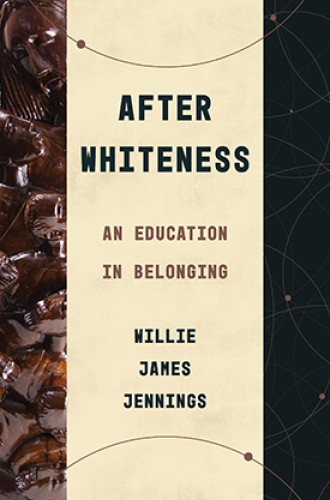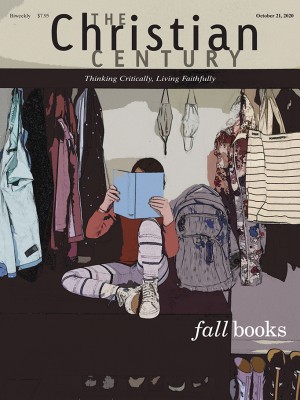Willie Jennings’s plea to create a new kind of theologian
After Whiteness is urgent reading for any institution that purports to care about God and race.
Amid a profusion of stunningly dull reports about theological education, After Whiteness hums with urgency. If Barth’s Der Römerbrief was, as Karl Adam claimed, “a bomb that fell on the playground of the theologians,” this book is a lightning bolt that craters the faculty lounge and the administrative wing simultaneously, upending conversations as stale as the coffee and charging life into the corpse-like hulk of theological education. It will be urgent reading for any institution that purports to care even a little about God and race.
Willie James Jennings was a longtime and beloved academic dean at Duke Divinity School, where I studied with him. His course, like Stanley Hauerwas’s introduction to ethics, was the sort that did more than educate. It was a big tent revival, drawing amens, sparking shrieking protests, and winning sweaty converts. It also left students wildly disoriented as they stepped out of the classroom and their dreams of a church after Whiteness withered.
Read our latest issue or browse back issues.
When Jennings stepped out of administration and began teaching at Yale Divinity School, he began to write what he’d long taught. His 2011 book The Christian Imagination speaks of the “diseased social imagination” of White Western Christianity, naming the inability of placid liberalism (“I don’t see color”) and of arrogant orthodoxy (“all that matters is defeating the liberals”) to heal themselves. God, in the Jewish flesh of Jesus, creates a new belonging that draws us out of our old identities and into a new Jew-plus-gentile humanity in the body of the risen Jesus. Jennings’s 2017 commentary on Acts witnesses to this new humanity on every page.
After Whiteness undoes the pretension of boasty theobrogians who seek to dominate the battlespace of theology. Its title is a clear riposte to Alasdair MacIntyre’s After Virtue. Sure, Aquinas is great and all, but he didn’t interrupt the slave ships, did he? Jennings seeks to show that theological education in the West was designed to create one type of theologian: the educated man, master of the plantation, dispassionate classifier of all lesser beings.
Women and people of color may try to crack this master class and act like their White male masters, but their performance will be evaluated suspiciously. In America’s long immigrant history, people of many races have sought admission to Whiteness. Some have succeeded somewhat: Irish, Italians, Jews. Some have been informed, with regret, of the denial of their application: Native Americans, Black people, Muslims. Latinos’ application is still under consideration, but the early returns are discouraging.
But what if the gospel explodes the categories altogether? Jennings asks this question with a skillful interweaving of a variety of genres not often attempted in theology, including poetry and extensive personal vignettes. The poetry makes unforgettable what no number of graphs and spreadsheets could express, that being born all over again is possible:
“I don’t see a way out,” he said to me.
“These problems cover me too thickly,” he said to me.
“Tattooed into my skin,” he said.
“Really?” I said.
“I will take them to my grave,” he said.
Then I said, “That sounds reasonable
to me, Nicodemus.”
Jennings knows full well the critical charges that will be levied against this book. The university is not a church. We expect excellence here. Professors provide a fee for service. And what about all the progress we’ve made on race relations?
Jennings understands traditionalism. He was formed by crusaders for neoorthodoxy, studying at Calvin and Fuller, writing a dissertation at Duke on Athanasius and Barth. As an administrator he saw its fallout: professors judging one another over who is “a serious scholar,” faculty whose whole world could be renewed just by setting foot in their students’ churches but who refuse the hard work of reciprocal learning, champions in the performance of Whiteness terrified that their foot may now slip from the summit. “We have failed to see,” he writes, that mutual belonging to Jesus is “the ground of theological education that aims at the good.”
Whiteness is not an ontological category, Jennings writes. It is an optic, a way of seeing ourselves and others that justifies ripping people off their land on one continent and forcing upon them labor and sex and death on another. Part of its success is its hiddenness in plain sight. Once Whiteness is seen and named, it draws the most vehement protests. All of this is familiar from other, more secular books on race. Robin DiAngelo’s phrase “white fragility” gets at the dynamic well.
But there’s something unique in Jennings that DiAngelo, Ta-Nehisi Coates, and Ibram X. Kendi can’t quite see or say. A new belonging is possible after Whiteness. It is born in an intimacy with Jesus, who draws a motley crowd to himself and shows us that our desire for him also means we desire good for one another. There is new life on the far side of the cross, and in Jennings’s company, you can almost see it.
Jennings’s vignettes are powerful, so much so that my White self, not yet quite crucified, often objected as I read them. That can’t be right! Minorities and women have a leg up in hiring! You lie! Then I’d remember that I trust Jennings, and I’d hope for the death of my old Adam.
Until I read this book, I’d never seen anyone thematize the degree to which the theological academy becomes a place where faculty go to escape from the church. These escapees can “only imagine social life on the run where friendships form with suspicious and vigilant volunteers, always ready to escape once more if they sense confinement approaching.” Jennings is talking here not only about theology’s deconstructors, but also about traditionalists who believe they need no antiracism training, no aid in Jesus’ sort of belonging.
I still wonder, to put the question in Jennings’s own Reformed key—does Jesus not win victory despite our resistance? The book is a plea, a summons, to all who are involved in theological education: open yourself up to what only Jesus can do, so that we might move beyond the diseased social imagination that theology has created. I wonder if we really have the agency to open ourselves up. Doesn’t the Holy Spirit have to do even that opening for us?
One indelible memory for generations of Duke students is Jennings’s laugh. He often laughed at himself and at us, not with scorn but with sympathy and compassion. But his laugh also signaled something more: in the end, God gets the world God wants. It may be rough on us in the meantime—who wants a cross? But there is not a bit of creation that God will not redeem on the far side of that cross. If such joy is possible in the face of an unflinching stare into our most grievous wound, what could ever be impossible?






